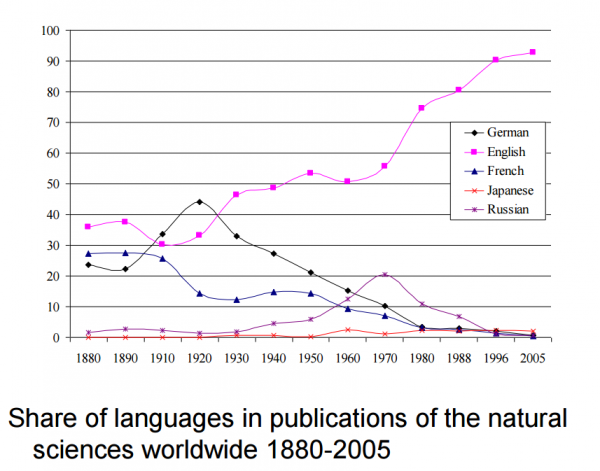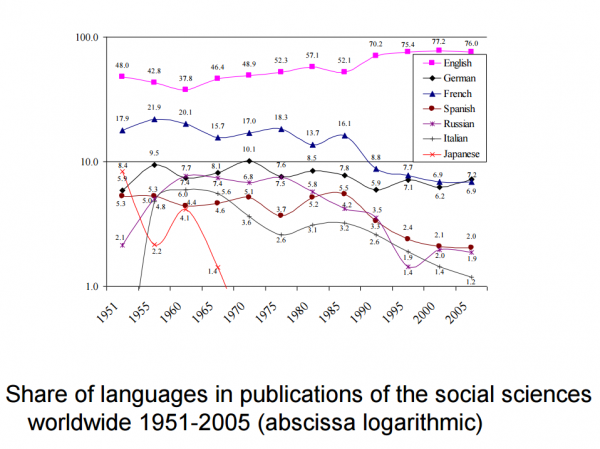|
阅读:2470回复:3
几百年前欧洲各国科学家用什么语言通信?
几百年前英语在欧洲各国不是那么流行的时候
他们之间写信用什么语言文字?拉丁语吗? 比如意大利的伽利略和德国的开普勒之间通信的时候? 或者开普勒和丹麦的第谷交谈,用什么语言? |
|
最新喜欢: |
|
沙发#
发布于:2016-06-06 15:40
https://en.wikipedia.org/wiki/List_of_lingua_francas (类似文章谷歌百度上都有一大堆,我就不赘列了)
Greek and Latin During the time of the Hellenistic civilization and Roman Empire, the lingua francas were Koine Greek and Latin. During the Middle Ages, the lingua franca was Greek in the parts of Europe, Middle East and Northern Africa where the Byzantine Empire held hegemony, and Latin was primarily used in the rest of Europe. Latin, for a significant portion of the expansion of the Roman Catholic Church, was the universal language of prayer and worship. During the Second Vatican Council, Catholic liturgy changed to local languages, although Latin remains the official language of the Vatican. Latin was used as the language of scholars in Europe until the early 19th century in most subjects. For instance, Christopher Simpson's "Chelys or The Division viol" on how to improvise on the viol (viola da gamba) was published in 1665 in a multilingual edition in Latin and English, to make the material accessible for the wider European music community. Another example is the Danish-Norwegian writer Ludvig Holberg, who published his book "Nicolai Klimii iter subterraneum" in 1741 about an ideal society "Potu" ("Utop" backwards) with equality between the genders and an egalitarian structure, in Latin in Germany to avoid Danish censorship and to reach a greater audience. Newton's Philosophiæ Naturalis Principia Mathematica was published in Latin in 1687: the first English translation did not appear until 1729. In subjects like medicine and theology Latin has been a subject of study until the present day in most European universities, despite declining use in recent years. http://www.aca-secretariat.be/fileadmin/aca_docs/images/members/Ulrich_Ammon.pdf During the 19th century a milder version of d‘Alembert‘s fear became true in the form of the three languages French, English, and German which practically every scientist or scholar had to know, though two of them perhaps only passively, in order to keep abreast of the developments in her field. 该文附赠的经典笑话: “Notre Langue étant répandue par toute l'Europe, nous avons crû qu'il étoit tems de la substituer à la Langue latine, qui depuis la renaissance des Lettres étoit celle de nos Savans. […] L'Angleterre nous a donc imité; l'Allemagne, où le Latin sembloit s'être refugié, commence insensiblement à en perdre l'usage: je ne doute pas qu'elle ne soit bien-tôt suivie par les Suédois, les Danois, & les Russiens. Ainsi, avant la fin du dixhuitieme siecle, un Philosophe qui voudra s'instruire à fond des découvertes de ses prédécesseurs, sera contraint de charger sa mémoire de sept à huit Langues différentes ; & après avoir consumé à les apprendre le tems le plus précieux de sa vie, il mourra avant de commencer à s'instruire.” (“Discours des editeur”, Encyclopédie, Tombe I, 1751: 39f.) 以及几个图例: 图片:NS.png 
图片:SS.png  |
|
|
板凳#
发布于:2016-06-06 15:28
两者间用的拉丁语
ScienceDirect: Correspondence between Kepler and Galileo
Academia: The use of Latin and the European Republic of Letters: Change and continuity in the seventeenth and eighteenth centuries
|
|
|
地板#
发布于:2016-05-28 00:28
以前欧洲学者多用拉丁语通信
还有个笑话 当年英国安妮女王去世,她没有子嗣,于是英国人请了汉诺威选帝侯乔治来当国王,是为乔治一世,然而...国王说德语...大臣说英语...最后大家都听不懂...讨论国事用拉丁语。国王嫌麻烦,于是就诞生了首相一职 |
|



